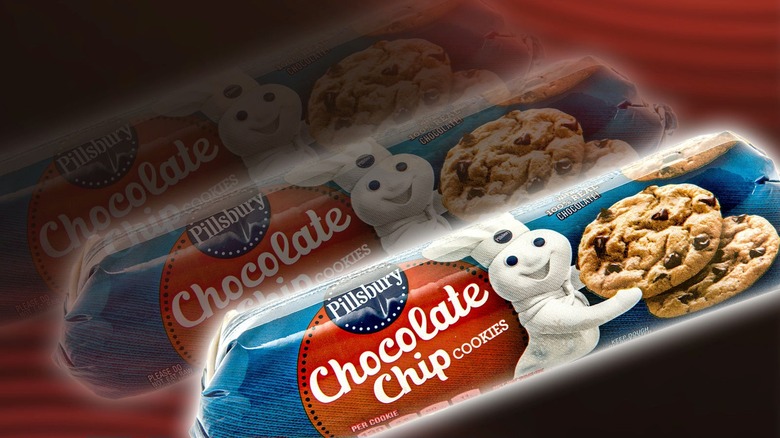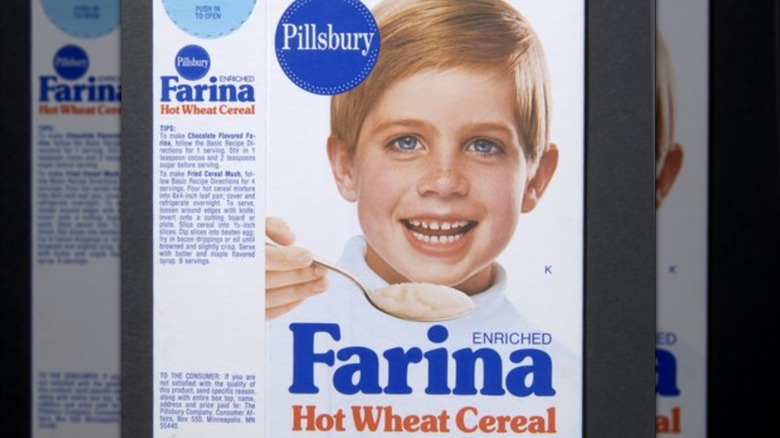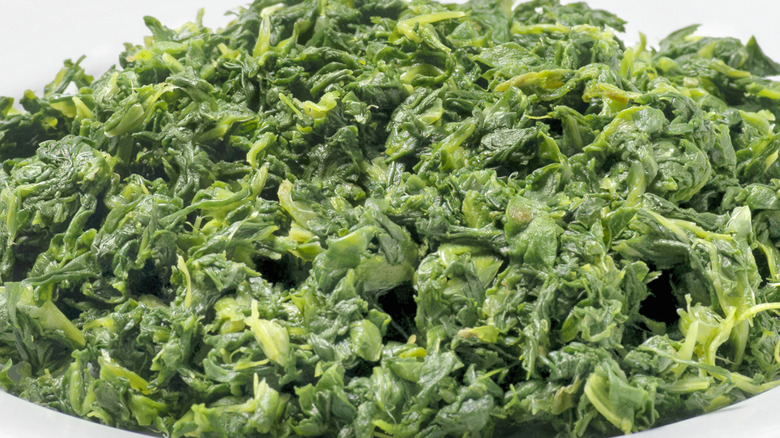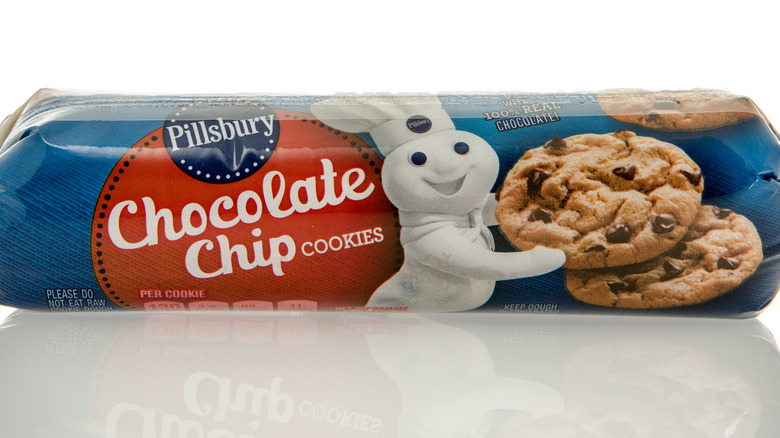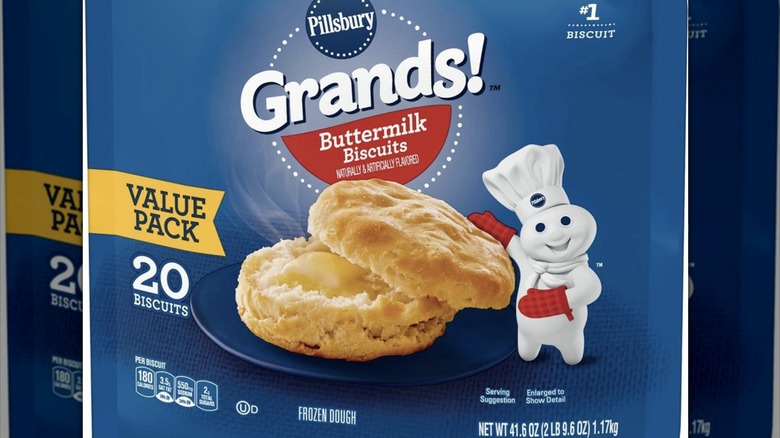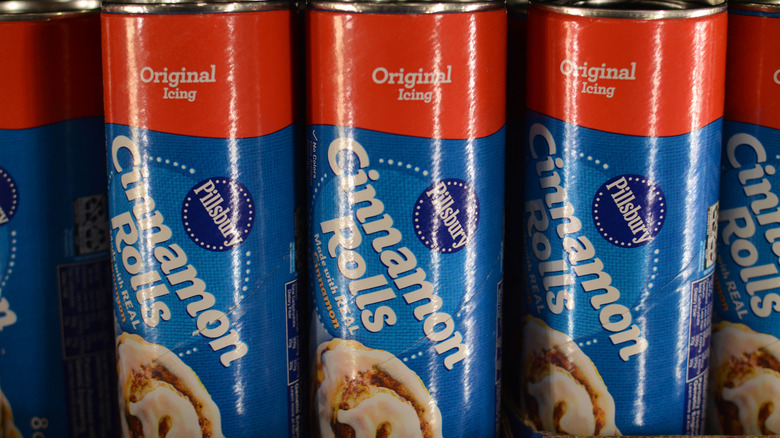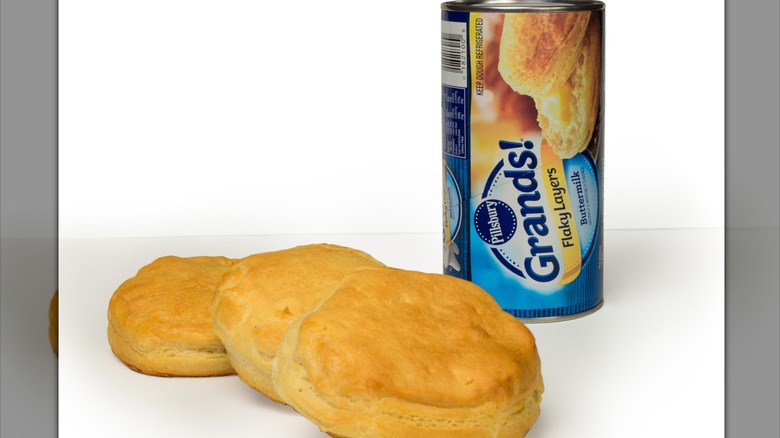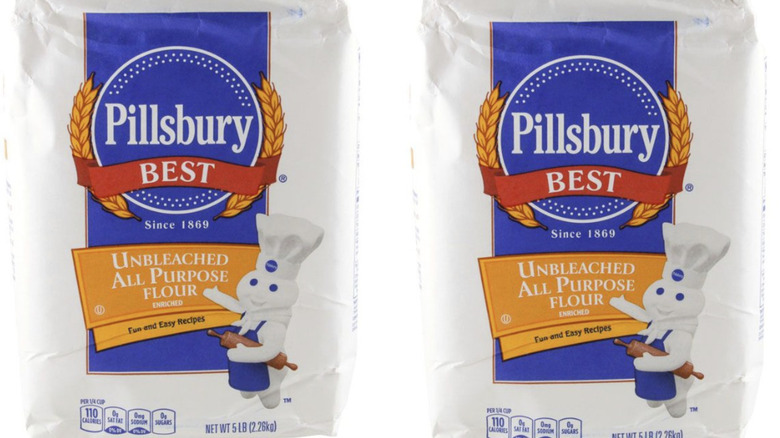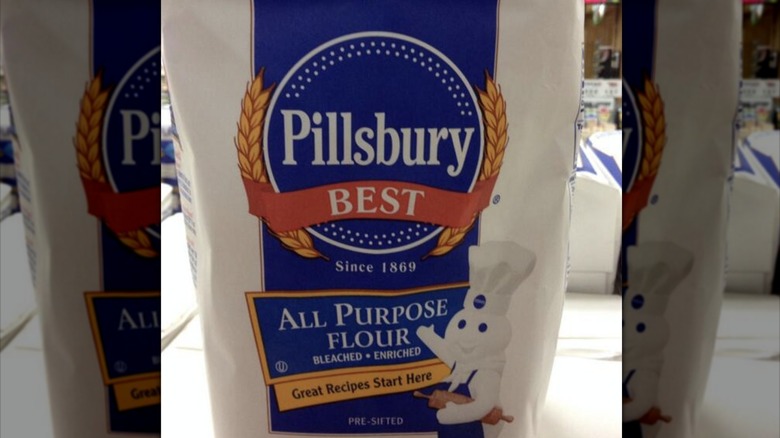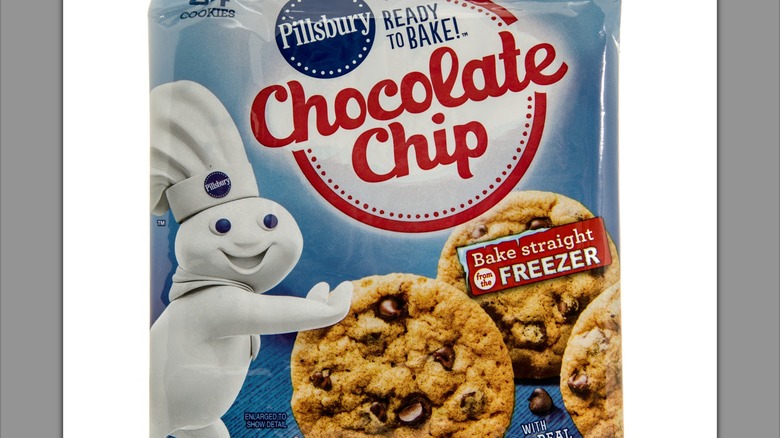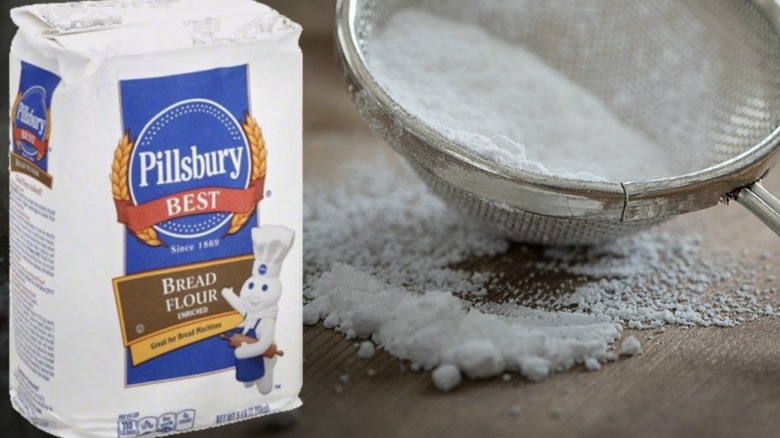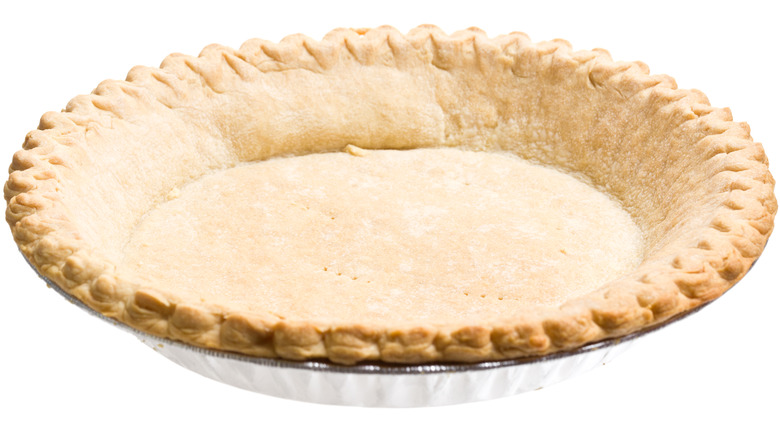The Biggest Pillsbury Recalls In History
Pillsbury is one of the most recognizable and historic American food brands. It's a leader in the baking market, producing flour, ready-made dough, cake mixes, and frosting that consumers have relied on for generations. The brand's doughboy mascot, Poppin' Fresh, is downright adorable. The world of Pillsbury hasn't been sweetness and light all the time though. Food recalls have been a recurring problem for Pillsbury.
Mishaps on Pillsbury's production line have caused some substantial problems for both the brand and the consumers who buy its goods. When products intended for consumer consumption are faulty or contaminated, they put the health and safety of the public at risk. If a brand's quality control measures don't catch these problems before the product hits the market, the faulty goods must be recalled. At this late stage, the Food and Drug Administration (FDA) is almost always involved.
The main reasons a food product is recalled are: the presence of a foreign object, contamination from foodborne pathogens, and non-disclosure of a major allergen. Pillsbury has dealt with all three. In some instances, the food recall was so large, it rocked the status-quo of the baking industry at large. Let's look at some of the biggest recalls that have put the public's health and Pillsbury's time-honored reputation in a precarious position.
Farina cereal in 1971
When Pillsbury had its first major recall in 1971, its products had been pantry staples for over 50 years. Pillsbury's breakfast game was strong in the '70s. New-age items like Gorilla Milk Instant Breakfast and nutrition bars (called Figurines) joined more conventional offerings like pancake and waffle mix. Hot farina cereal, another throwback Pillsbury item, was the target of the recall. Some cereal packets were suspected to contain particles of glass.
Tiny glass bits have a special way of hiding in plain sight and Pillsbury wasn't taking risks. In March 1971, the company recalled 27.5-ounce packages of farina cereal under a single lot code. The recall affected Pillsbury farina cereal sold throughout Massachusetts and Connecticut. A statement from Pillsbury's corporate office explained that the recalled cereal made accidental contact with remnants from a shattered glass shield during processing. The incident occurred at a Pillsbury plant in Springfield, Illinois on November 23, 1970.
A few years before the 1971 recall, Pillsbury was contracted by the U.S. government to develop specialty food products for astronauts to ensure they would not get food poisoning in space. The glass-meets-farina ordeal didn't destroy Pillsbury's credibility with the feds though. Instead, it motivated Pillsbury's director of research at the time, Dr. Howard Bauman, to speak at the 1971 National Conference on Food Protection. In 1972, Pillsbury held training programs for FDA investigators that helped popularize the hazard analysis and critical control points (HACCP) system. HACCP remains a touchstone in food safety standards today.
Cut-leaf spinach in 1995
In case you ever questioned the scope of Pillsbury's reach, keep in mind that the bakery brand owned fellow household name Green Giant for decades. Between 1979 and 2001 Pillsbury oversaw the production of Green Giants' products — which were primarily vegetable in nature — and only ceased ownership when both labels were acquired by General Mills. When Green Giant ran into some quality assurance trouble with its cut-leaf spinach in 1995, it was up to Pillsbury to deal with the problem.
When a consumer in Connecticut found fly larvae in a box of Green Giant spinach, the FDA jumped on it. In early June 1995, investigators tested Green Giant spinach pulled from the supplier's warehouse. These spinach samples tested positive for fly larvae and rodent contaminants. Initially, Pillsbury issued a nationwide recall for two production codes of Green Giant Cut-Leaf Spinach in Butter Sauce — but this was only step one.
In a flurry of damage control, Pillsbury expanded the recall, looping in over two dozen production codes of boxed and bagged spinach. All of the recalled products, which included 16-ounce bags of Green Giant Pasta Accents Florentine and Cut-Leaf Spinach in bags, contained spinach from the tainted batch and were manufactured around the same time as the contaminated frozen spinach purchased in Connecticut.
Cookie dough in 1998
Pillsbury managed to make it through the 1980s without any major food recalls, and most of the '90s too. In 1998, Pillsbury issued a recall for 8,824 cases of its refrigerated chocolate chip cookie dough because they were mislabeled. An oversight during manufacturing resulted in thousands of Pillsbury chocolate chip cookie dough packages being filled with walnut cookie dough.
A seemingly simple mistake like this one is anything but. The FDA classifies tree nuts (like walnuts) as a major allergen and requires all food manufacturers to print a warning on the packaging of any product that contains them. Shoppers who bought Pillsbury chocolate chip cookie dough and received walnut cookie dough faced more than just disappointment, someone could potentially wind up having a severe allergic reaction. Consumers with a severe tree nut allergy who unknowingly consume walnuts may go into anaphylactic shock, a rapid-onset reaction that can be fatal.
News of the recall broke on September 8, 1998, warning the public that the affected packages had a best by date of November 18, 1998. No illnesses were reported in connection with the cookie dough mix-up, but Pillsbury's cleanup wasn't done yet. Just over a month later, the recall was expanded after it was discovered that a warehouse in Chicago had distributed the mislabeled Pillsbury dough to grocers in Illinois, Indiana, Iowa, and Wisconsin.
Frozen biscuits in 2001
The sale of Pillsbury frozen biscuits came to a screeching halt in late June 2001 when 30,000 cases were recalled due to contamination from a foreign object. Pillsbury's national biscuit recall occurred exactly 30 years after the brand's first recall ever, for farina cereal that contained glass from a factory accident. The frozen biscuits menacing the public in the new millennium, however, were tainted with strands of plastic.
If you're thinking that strands of plastic in a biscuit sounds less threatening than pulverized glass in your breakfast bowl, we get it. Even so, plastic strands in food is a big-time choking hazard. Pillsbury frozen biscuits, Homestyle frozen buttermilk biscuits, and Homestyle frozen biscuits, Southern style were all pulled from stores once the recall was announced.
A slew of production date codes were under suspicion. Pillsbury urged consumers who may have purchased the affected biscuits to call the company's 1-800 number. Pillsbury's voluntary recall was eventually resolved, but its biscuit blunders and plastic problems weren't over for good.
Chocolate chip muffin mix in 2002
The 21st century wasn't a great era for Pillsbury's relationship with public health. Barely a year after grappling with a massive frozen biscuit recall, trouble was afoot at the factory. Pillsbury issued a multi-state recall for its chocolate chip muffin mix as a cautionary measure in September 2002. Chocolate chip muffin mix sold in Illinois, Iowa, Maine, Massachusetts, Michigan, Minnesota, Nebraska, New York, North Dakota, South Dakota, Vermont, and Wisconsin were found to contain chocolate chips made with milk — something the packaging did not specify with the necessary food allergy warning.
Rather than wait for the FDA to maybe notice that Pillsbury put the wrong chips in the bag, the brand recalled the mislabeled packages voluntarily. The decision cost Pillsbury 753 cases of chocolate chip mix, but pulling the faulty products from distribution prevented consumers with a milk allergy or sensitivity from getting sick. There were no reported illnesses connected to Pillsbury's chocolate chip mix. When manufacturing goes to plan, Pillsbury chocolate chip mix contains semisweet chocolate chips only, which are dairy-free.
Cinnamon rolls with icing in 2013
Cinnamon rolls are one of Pillsbury's most popular items, so many shoppers were let down when its Refrigerated Cinnamon Rolls with Icing fell prey to a product recall in September 2013. Another blunder on the production line was to blame. A broken piece of plastic near the manufacturing equipment wasn't removed from the line in time. With nobody to sweep away the obstacle, shards of plastic got all up in the dough — and it was quite a lot of dough.
Once Pillsbury became aware of the situation, a Class II voluntary recall was initiated. Pillsbury pulled its Cinnamon Rolls with Icing from store shelves nationwide. Gobbling up a Pillsbury cinnamon roll with cracked-up plastic bits inside is a choking hazard, and Pillsbury isn't interested in serving its baked goods with a side of danger.
Pillsbury Flaky Cinnamon Rolls and Pillsbury Grands! Cinnamon Rolls were spared from the recall. Eight-count single packs and double packs of Refrigerated Cinnamon Rolls with Icing with four separate best buy dates accounted for the recalled product. In total, the recall encapsulated a jaw-dropping 917,947 pounds of plastic-tainted cinnamon rolls.
Biscuit dough in 2014
For the baker on the go, Pillsbury's refrigerated biscuit dough is a convenient and tasty answer to a home baked goodie. The baker on the go should also be able to trust that the outside of the package matches what's within. This has been a recurring problem for bakery titans like Pillsbury and Hostess, and inevitably results in food recalls. In September 2014, Pillsbury was forced to reevaluate the Refrigerated Biscuit Flaky Layers and Refrigerated Buttermilk Biscuits that were on sale in retail markets nationwide when undeclared milk made its way into the mix.
Once more, something went wrong at the Pillsbury factory triggering biscuit dough intended for mass consumption going into the wrong package. This time, individually wrapped packages of buttermilk biscuits found their way into Biscuit Flaky Layers four-pack wrapping. Although the individually wrapped packages indicated an accurate list of ingredients, when ensconced in the four-pack wrapping, the ingredients list did not indicate the presence of milk. Pillsbury fired off a voluntary Class II recall due to the undeclared allergen of milk. The recall affected 720 cases of biscuits and stayed in effect until January 27, 2015. No illnesses were reported in conjunction with the recall.
Unbleached all-purpose flour in 2019
Talk of Pillsbury conjures up visions of cakes, rolls, biscuits and more, but what you might be forgetting is that none of these would be possible without flour. Yes, flour, the literal building block on which Pillsbury still stands. Pillsbury was first established in 1869 as a flour miller. With the help of industry and enterprise, Pillsbury's original Minneapolis facility reigned as the largest mill on the planet for 40 years. A recall of Pillsbury All-Purpose Flour in 2019 stood to question the very thing that made the brand what it is today.
Flour. It's such innocuous stuff, which makes consumers aghast at the thought that it could contain feasibly life-threatening properties. Pillsbury's legacy in tandem with the presumed innocence of white flour was put into question when it was first recalled in March 2019. The discovery took shape after a random inspection turned up traces of salmonella in a single bag of flour. At that time, Pillsbury had shipped most of its product to Publix and Winn-Dixie grocery stores. After learning the test results, Pillsbury recalled two lots of all-purpose flour.
Pillsbury wasn't alone in the struggle. In January 2019, General Mills launched a national recall of its five-pound bags of Gold Medal Unbleached Flour due to salmonella contamination. The Class II recall impacted 489,800 pounds of Pillsbury flour. Unfortunately, Pillsbury recalls for 2019 were just getting started.
All-purpose flour in 2019
After a salmonella contamination compromised Pillsbury Unbleached All-Purpose flour in March 2019, the company didn't have time to catch its breath. Matters went from bad to worse in a couple of months. On May 22, 2019, ADM Milling Company let loose a monstrous all-purpose flour recall due to E. coli O26 contamination. Pillsbury's flour was included in the multi–brand recall, which swept 16,695,111 pounds of flour away from shoppers' grasp.
A recall of this magnitude doesn't happen all at once. ADM's head-to-head with E. coli-laden flour began with Aldi brand Baker's Corner All-Purpose Flour, which tested positive for E. coli after the product was linked to 17 illnesses across eight states. The flour was sourced from a production facility in Buffalo, New York. ADM recalled 2,510,400 pounds of Baker's Corner All-Purpose Flour alone. For whatever reason, ADM chose to release the recall that affected Aldi's flour and the multi-brand flour recall that affected Pillsbury on the same day, for the same reason, but kept them separate.
The E. coli breakout impacted much of the domestic flour industry. ADM, also known as Archer Daniels Midland Company, is one of the world's largest manufacturers of agricultural goods. When the outbreak became common knowledge, the company employed 40,000 people and serviced nearly 200 countries. The source of the E. coli O26 contamination was never specified.
Cookie and biscuit dough in 2019
Just as Pillsbury relies on mega flour purveyor ADM Milling Co. to get its flour where it needs to go, the company puts similar trust in industry leader C&S Wholesale Grocers to shepherd its numerous products to retailers far and wide. When ADM couriered E. coli-tainted flour throughout the nation in 2019, Pillsbury was hit with huge recalls. That same year, C&S had to reckon with quality assurance breakdowns, and Pillsbury became a casualty to fault lines of mass-production yet again.
Picture this, a tractor trailer truck transporting mountains of grocery food to multiple Target locations loses refrigeration. With no choice but to carry on, the truck carrying the products reaches its destination and unloads. A full-scale recall due to the compromising of perishable products was the only option. The FDA logged the reason for the Class II recall as process deviation and temperature abuse. There were 51 brands included in the June 2019 recall, which afflicted 330 products. Among them was Pillsbury dough.
The recalled foods were delivered to two Target stores in New York. Target employees were instructed to remove the products in question from store shelves. Pillsbury, which was in the midst of a flour recall for the ages, lost some pastry dough in the process, but no illnesses were ever reported in conjunction with the C&S breakdown.
Bread flour in 2019
As the ADM Milling Co.'s E. coli O26 outbreak sent shockwaves through the flour industry in the spring of 2019, Pillsbury wasn't able to get by with its initial recall of All-Purpose flour, which occurred in May. Pillsbury's parent brand, Hometown Food Company, took it upon itself to issue another recall for Pillsbury Best Bread Flour on June 14, 2019. The recall was set forth in association with the E. coli drama happening at ADM, which had already pulled Pillsbury All-Purpose Flour into a recall that accounted for over 16 million pounds of product. Hometown Food Company's June 2019 recall removed 184,800 pounds of Pillsbury Best Bread Flour from distribution.
Pillsbury advised consumers in possession of its bread flour to return it to the point of purchase for a refund. No illnesses specifically pointed to Pillsbury's bread flour, however, other ADM-produced flours, such as Aldi's Baker's Corner, had already sickened consumers across several states. The E. coli O26 outbreak was narrowed down to flour processed at ADM's manufacturing plant in Buffalo, New York. The wheat milled into flour at this location has been suggested as the point of the bacteria's origin, however, this was never confirmed outright by the FDA, ADM, or Pillsbury.
Pie crust in 2021
In 2019, Pillsbury contended with one food recall after another. After the flour dust finally settled, the brand managed to resume business as usual — until May 2021. All of Pillsbury's food recalls before then pertained to products aimed at the general consumer. Its latest recall posed an issue with the U.S. Armed Forces.
The Defense Commissary Agency, which is responsible for feeding our nation's troops, levied a complaint to Pillsbury's parent company General Mills over its pie crust. According to the agency, some Pillsbury Refrigerated Pie Crust stocked in military commissary kitchens and stores had an "off-flavor." The complaint didn't exactly leverage concerns over whether the pie crust had fallen victim to a foodborne pathogen, however, the quality of the product didn't meet the department's expectations.
Pillsbury, a company that collaborated with NASA on astronaut-approved snacks in the 1960s, didn't risk its reputation in regards to this complaint. General Mills withdrew one product code's worth of inventory of pie crust from military distribution. Since then, Pillsbury has remained recall–free.
